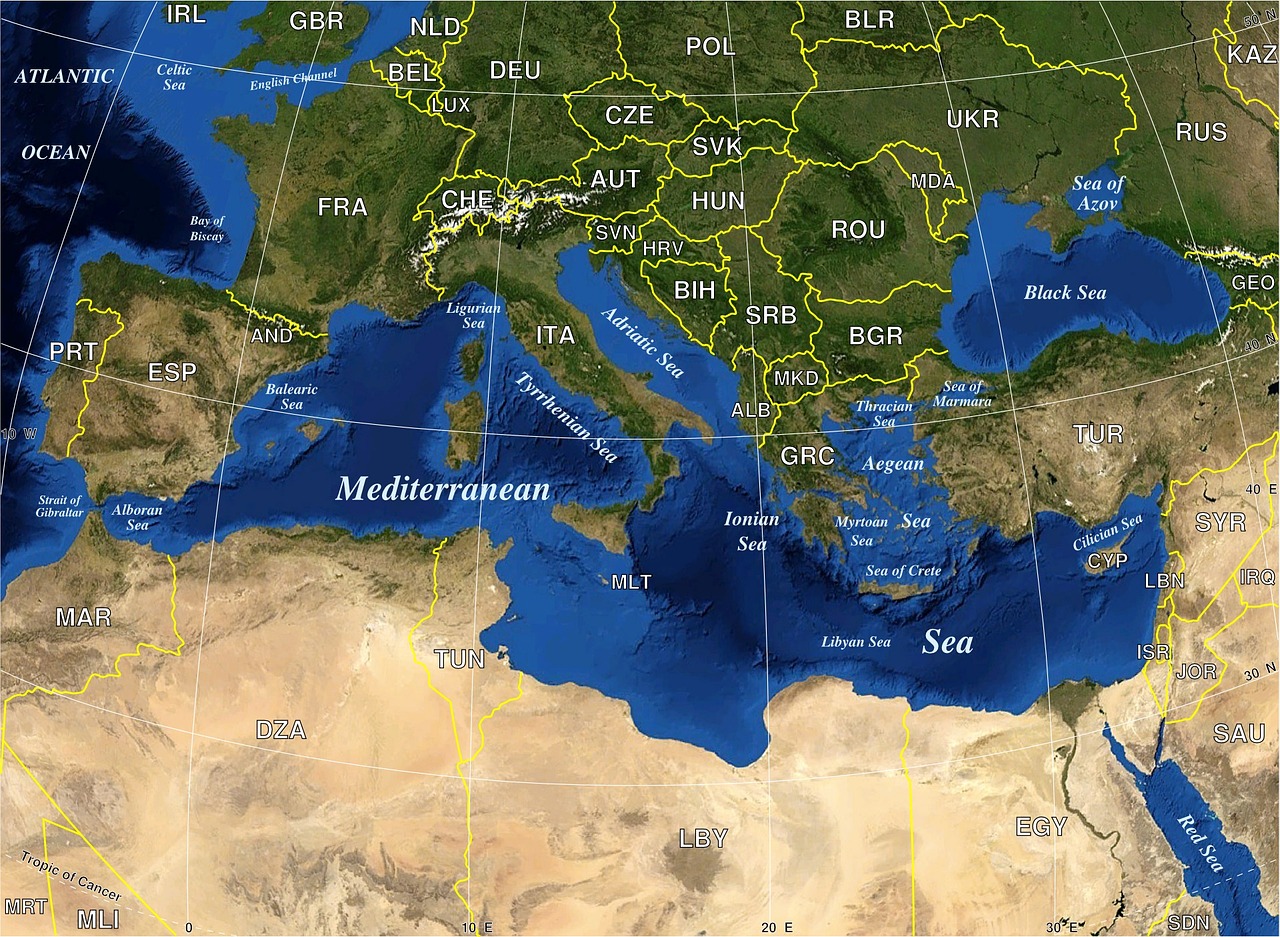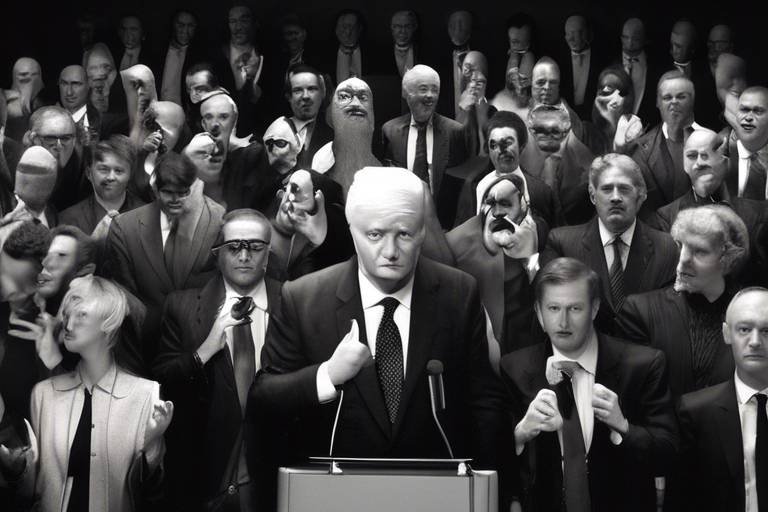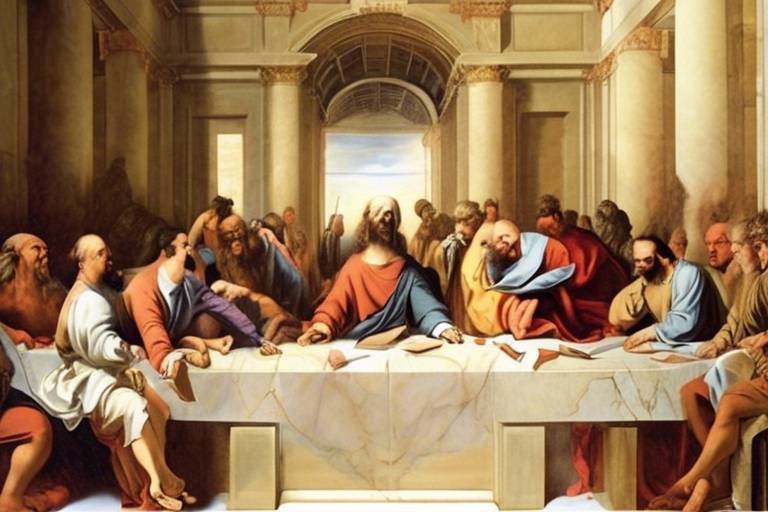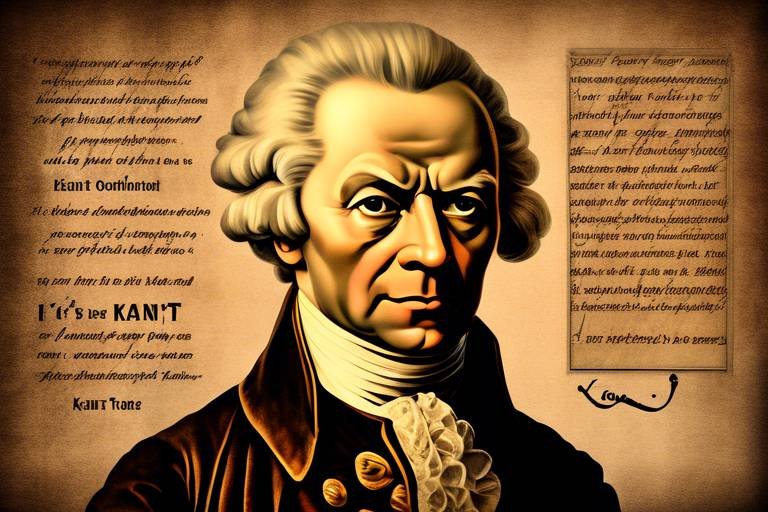Is There a Single 'Right' Political Philosophy?
When we dive into the realm of political philosophy, we often find ourselves asking a fundamental question: is there a single, universally accepted ideology that can effectively govern societies around the globe? The answer isn't as straightforward as we might hope. Political philosophy is not just a collection of abstract ideas; it’s a living, breathing discourse shaped by human experiences, historical contexts, and cultural values. Just like a kaleidoscope, the view changes depending on how you turn it, reflecting the complexities of our world.
The quest for a 'right' political philosophy is akin to searching for the Holy Grail. Many have sought it, yet few have found a consensus. Some might argue that liberalism, with its emphasis on individual freedoms and democratic governance, offers the most compelling framework for modern societies. Others might contend that socialism, advocating for collective ownership and equality, presents a more just alternative. And then there are those who champion conservatism, valuing tradition and stability, or anarchism, which calls for a stateless society. Each of these philosophies presents a unique lens through which to view governance and society, but none can claim absolute superiority.
Consider this: if we were to create a table comparing these major political philosophies, we would see distinct differences in their core principles, historical contexts, and implications for governance. For instance:
| Political Philosophy | Core Principles | Historical Context |
|---|---|---|
| Liberalism | Individual rights, democracy, free markets | Emerged during the Enlightenment, influenced by thinkers like John Locke |
| Socialism | Collective ownership, economic equality | Developed in response to industrial capitalism, influenced by Karl Marx |
| Conservatism | Tradition, social stability, hierarchy | Rooted in reaction to the French Revolution, emphasized by Edmund Burke |
| Anarchism | Stateless society, anti-authoritarianism | Grew from opposition to state power, influenced by thinkers like Mikhail Bakunin |
This table illustrates that while these philosophies share the common goal of addressing societal needs, they diverge significantly in their approaches. The real challenge lies in understanding how these ideologies can coexist in a world that is increasingly interconnected yet culturally diverse.
Moreover, the conversation about political philosophy is not static; it evolves with the times. As societies face new challenges—such as climate change, technological advancements, and economic inequalities—the relevance of these philosophies is continually tested. Can a single ideology adapt to the myriad of circumstances that different cultures and societies encounter? Or do we need a more pluralistic approach that embraces multiple philosophies? These questions highlight the ongoing debate between universalism and relativism in political thought.
In conclusion, the search for a single 'right' political philosophy is not only complex but also deeply reflective of our shared human experience. It challenges us to consider the values we hold dear, the systems we wish to implement, and the kind of society we aspire to create. As we navigate this intricate landscape, we must remain open to dialogue and understanding, recognizing that the richness of political philosophy lies in its diversity.
- What is political philosophy? Political philosophy examines fundamental questions about power, justice, and governance.
- Can one political philosophy work for all societies? There is no definitive answer; the effectiveness of a political philosophy often depends on cultural and historical contexts.
- What are the major political philosophies? Key philosophies include liberalism, socialism, conservatism, and anarchism, each with its unique principles.
- How do historical events shape political ideologies? Major historical events often influence the development and acceptance of political philosophies, reflecting societal needs and values.
- Is there a future for political philosophy? Yes, as new global challenges arise, political philosophy will continue to evolve and adapt.

The Nature of Political Philosophy
Political philosophy is a fascinating and intricate field that dives deep into the fundamental questions of power, justice, and governance. At its core, it seeks to understand the principles that should guide the organization of society and the relationships between individuals and their governing bodies. Think of it as the backbone of political systems, where ideas about what is fair and just are debated and dissected. Have you ever wondered why some societies prioritize individual freedom while others emphasize community welfare? This divergence often stems from the underlying political philosophies that shape their governance.
One of the key aspects of political philosophy is its ability to adapt and evolve over time. Just like a living organism, political philosophies respond to the changing needs and values of society. For instance, the rise of globalization has prompted new discussions about citizenship and national identity, challenging traditional notions of sovereignty and governance. The very nature of political philosophy is to question and redefine itself in light of new realities. This dynamic nature makes it both exciting and complex, as it continuously grapples with the intricacies of human behavior and societal needs.
Moreover, political philosophy is not just an academic exercise; it has real-world implications. The ideologies that emerge from this field can influence laws, policies, and even the way people interact with each other. Consider how different political systems prioritize various societal needs. A liberal philosophy might advocate for personal freedoms and market economies, while a socialist approach might emphasize equality and collective ownership. These differing priorities can lead to vastly different outcomes in terms of social justice and economic development.
To further illustrate the nature of political philosophy, let’s break down some of its core components:
- Power Dynamics: Who holds power and how it is exercised is a central concern. Political philosophy examines the legitimacy of authority and the rights of individuals versus the state.
- Justice: What does it mean to be just? Different philosophical traditions offer various interpretations of justice, ranging from distributive justice to retributive justice.
- Governance Structures: The frameworks through which societies are organized—be it democracy, autocracy, or something else—are shaped by political philosophy.
In essence, the nature of political philosophy is about grappling with the big questions that affect our lives and societies. It serves as a lens through which we can examine the effectiveness and morality of our political systems. By understanding the philosophies that underpin our governance, we can better engage in discussions about the direction of our societies and the values we wish to uphold.
- What is political philosophy? Political philosophy is the study of fundamental questions regarding power, justice, rights, and the role of government in society.
- Why is political philosophy important? It helps us understand the principles that govern societies and influences laws, policies, and individual rights.
- How do political philosophies evolve? Political philosophies evolve in response to societal changes, historical events, and emerging global challenges.

Major Political Philosophies
Political philosophy is a rich tapestry woven from diverse ideologies that have evolved over centuries. Each political philosophy offers a unique lens through which we can understand power, governance, and justice. Among the most prominent political philosophies are liberalism, conservatism, socialism, and anarchism. These ideologies not only reflect different values and beliefs but also provide frameworks for analyzing how societies organize themselves.
Liberalism champions individual freedoms and equality, advocating for a government that protects the rights of its citizens. Rooted in Enlightenment thought, liberalism emphasizes the importance of personal liberties, free markets, and democratic governance. Think of liberalism as a garden where every flower, representing individual rights, has the space to bloom without interference. It promotes the idea that everyone should have an equal opportunity to pursue their happiness, often leading to policies that support civil rights and social justice.
On the other hand, conservatism values tradition, social stability, and the importance of established institutions. Conservatives often argue that change should be gradual and that society should maintain a connection to its historical roots. Imagine conservatism as a sturdy oak tree, deeply rooted in the soil of tradition, offering shade and stability in a rapidly changing world. This philosophy often emphasizes the importance of family, religion, and community, arguing that these institutions are vital for a cohesive society.
Moving to socialism, this philosophy advocates for social ownership and democratic control of the means of production. It seeks to reduce inequality by redistributing wealth and providing universal access to essential services like healthcare and education. Picture socialism as a collective potluck dinner, where everyone contributes and shares food, ensuring that no one goes hungry. Socialists argue that when resources are shared, society as a whole benefits, and the gap between the rich and the poor can be narrowed.
Lastly, anarchism presents a radical departure from traditional governance structures, advocating for a society without hierarchies or coercive institutions. Anarchists believe that people can self-organize and cooperate voluntarily, leading to a more equitable society. Visualize anarchism as a vibrant community festival where everyone participates equally, without a central authority dictating the rules. While often misunderstood as chaos, anarchism envisions a world where individuals freely collaborate to create a just society.
To better understand these philosophies, let's summarize their core principles in the following table:
| Political Philosophy | Core Principles | Key Focus |
|---|---|---|
| Liberalism | Individual freedoms, equality, democracy | Rights of the individual |
| Conservatism | Tradition, stability, established institutions | Social cohesion |
| Socialism | Social ownership, wealth redistribution | Collective welfare |
| Anarchism | Voluntary cooperation, anti-hierarchy | Self-organization |
Each of these political philosophies offers a unique perspective on how societies can function. Understanding these differences is crucial for engaging in meaningful discussions about governance and justice. As we navigate the complexities of modern political landscapes, recognizing the strengths and weaknesses of each ideology can help us appreciate the diverse ways in which people envision a just society.
- What is the main difference between liberalism and conservatism?
Liberalism focuses on individual rights and freedoms, while conservatism emphasizes tradition and social stability. - How does socialism differ from anarchism?
Socialism advocates for collective ownership and government involvement, while anarchism seeks to eliminate all forms of hierarchical governance. - Can a society effectively implement one political philosophy?
It is often challenging, as diverse populations may have varying beliefs and values that influence their governance preferences.

Historical Contexts of Political Thought
The landscape of political philosophy is not static; it evolves and transforms in response to historical events, societal changes, and cultural shifts. Understanding the historical contexts of political thought is essential for grasping the development and relevance of various ideologies today. Each political philosophy can be seen as a reflection of the times in which it emerged, shaped by the challenges and aspirations of its era. For instance, the rise of liberalism in the 17th and 18th centuries coincided with the Age of Enlightenment, a period marked by a surge in reason, individualism, and scientific thought. Thinkers like John Locke and Jean-Jacques Rousseau championed ideas of personal liberty and social contracts, advocating for governance based on the consent of the governed.
In contrast, the emergence of socialism during the Industrial Revolution was a response to the stark inequalities brought on by rapid industrialization. Figures such as Karl Marx and Friedrich Engels critiqued the capitalist system, arguing that it exploited the working class. This historical backdrop of economic disparity and class struggle led to the development of socialist ideologies that sought to address these injustices through collective ownership and redistribution of resources. Similarly, conservatism arose as a reaction to the upheaval caused by revolutions, emphasizing the importance of tradition, social stability, and gradual change instead of radical reform.
Moreover, the context of the Cold War gave rise to various political ideologies as nations grappled with the dichotomy of capitalism versus communism. This period saw the proliferation of political thought that was deeply intertwined with national identity and global power dynamics. For example, the concept of anarchism gained traction as a response to both state power and capitalist exploitation, advocating for a society free from hierarchical structures.
To illustrate how historical events shape political philosophy, consider the following table, which highlights key political philosophies alongside their historical contexts:
| Political Philosophy | Historical Context | Key Figures |
|---|---|---|
| Liberalism | Age of Enlightenment | John Locke, Jean-Jacques Rousseau |
| Socialism | Industrial Revolution | Karl Marx, Friedrich Engels |
| Conservatism | Post-Revolutionary Europe | Edmund Burke |
| Anarchism | Response to State Power | Mikhail Bakunin, Emma Goldman |
This table encapsulates the essence of how historical events have influenced political philosophies. Each ideology is a product of its time, molded by the unique challenges and aspirations of society. As we continue to study these philosophies, it becomes increasingly clear that the interplay between history and political thought is intricate and profound, reminding us that our current political landscape is built upon the foundations laid by our predecessors.
- What is the significance of historical context in political philosophy?
Historical context helps us understand why certain political ideologies emerged and how they were shaped by the events of their time. - How do historical events influence modern political thought?
Modern political thought is often a reaction to past events, drawing lessons from history to address current societal challenges. - Can a single political philosophy be universally applied?
The debate over universalism versus relativism suggests that while some principles may be widely applicable, the effectiveness of a political philosophy often depends on cultural and historical context.

The Role of Culture in Political Philosophy
Culture is the invisible thread that weaves together the fabric of society, influencing how individuals perceive their world, their values, and ultimately, their political beliefs. It acts as a lens through which political philosophies are interpreted and implemented. For instance, consider how the concept of freedom is perceived differently across cultures. In Western societies, freedom often emphasizes individual rights and personal autonomy. In contrast, many Eastern cultures may view freedom in terms of community harmony and social responsibility. This divergence illustrates how culture shapes political ideologies, leading to varied interpretations and practices.
Moreover, cultural narratives and historical experiences contribute significantly to the development of political philosophies. Take, for example, the impact of colonialism on African political thought. The struggle against colonial powers birthed ideologies that prioritize collective identity and self-determination. These cultural legacies continue to influence contemporary political movements, highlighting the importance of context in shaping political discourse.
To further understand the role of culture in political philosophy, we can look at some key cultural elements that influence political ideologies:
- Religion: Religious beliefs often dictate moral values, which in turn shape political opinions. For instance, the influence of Christianity in the United States has led to the rise of conservative ideologies that prioritize family values and social conservatism.
- Tradition: Cultural traditions can either support or challenge existing political structures. Societies with strong tribal or communal traditions may resist individualistic political philosophies, favoring systems that emphasize collective governance.
- Language: The language we speak can limit or expand our political thought. Languages that have specific terms for concepts like democracy or justice may foster a more profound understanding and engagement with these ideas.
This cultural interplay is not merely academic; it has real-world implications. For example, when international organizations attempt to impose a universal political philosophy, they often encounter resistance rooted in local cultural contexts. This highlights the tension between global political ideals and local cultural practices, emphasizing that a one-size-fits-all approach to governance is often ineffective. Instead, understanding and respecting cultural differences can lead to more inclusive and effective political systems.
As we navigate the complexities of political philosophy, it becomes clear that culture is not just a backdrop but a dynamic force that shapes political thought. The challenge lies in recognizing and incorporating these cultural nuances into our understanding of governance and political ideologies. This cultural awareness can pave the way for more nuanced discussions about what constitutes justice, equity, and effective governance in a diverse world.
- How does culture influence political ideology?
Cultural beliefs and practices shape individuals' values, which in turn affect their political preferences and ideologies. - Can a political philosophy be universally applied?
While some principles may resonate globally, the application of political philosophies often varies based on cultural contexts. - What role does tradition play in political thought?
Tradition can either reinforce existing political structures or inspire movements for change, depending on the cultural context.

Debates on Universalism vs. Relativism
The debate between universalism and relativism in political philosophy is like a tug-of-war between two powerful ideologies, each pulling in opposite directions. Universalism posits that there are certain principles of justice and governance that should apply to all human beings, regardless of their cultural or societal context. In contrast, relativism argues that political ideologies and moral values are inherently shaped by cultural, historical, and social factors, meaning that what works in one society may not be suitable for another. This clash raises profound questions about the nature of justice and the role of context in shaping our political beliefs.
At its core, universalism seeks to establish a common ground for humanity, advocating for human rights and democratic principles that transcend borders. Think of it as a global blueprint for governance, where ideals like freedom, equality, and justice are seen as universal truths. However, critics of universalism often point out that this approach can be overly simplistic, ignoring the rich tapestry of cultural differences that define human societies. They argue that imposing a one-size-fits-all ideology can lead to cultural imperialism, where dominant cultures impose their values on others, often with detrimental consequences.
On the other hand, relativism embraces the idea that political beliefs and practices are deeply rooted in cultural contexts. This perspective highlights the importance of understanding local customs, traditions, and historical experiences when evaluating political systems. For instance, what may be considered a democratic practice in one country could be viewed as an infringement on cultural values in another. Relativists argue that we must respect these differences, advocating for a more nuanced understanding of governance that takes into account the unique circumstances of each society.
The tension between these two perspectives is palpable, and it often leads to heated discussions among political philosophers, policymakers, and activists. For example, consider the global discourse on human rights. Universalists argue that certain rights, such as freedom of speech and the right to a fair trial, should be upheld everywhere. In contrast, relativists might contend that these rights can be interpreted differently depending on cultural norms and values. This debate is not merely academic; it has real-world implications, influencing international relations, humanitarian interventions, and global governance.
To illustrate this further, let’s take a look at some key arguments in favor of both sides:
| Universalism | Relativism |
|---|---|
| Promotes a common standard for human rights. | Values cultural diversity and local practices. |
| Encourages global cooperation and unity. | Recognizes the importance of context in political practices. |
| Can lead to the protection of marginalized groups worldwide. | Prevents cultural imperialism and respects sovereignty. |
As we navigate through this complex landscape, it becomes clear that both universalism and relativism have their merits and shortcomings. The challenge lies in finding a balance between these two perspectives, recognizing that while we may strive for universal principles, we must also honor the diverse cultural contexts that shape our political realities. This ongoing debate is not just an intellectual exercise; it is a vital part of our quest for a just and equitable society where all voices are heard and respected.
- What is the main difference between universalism and relativism? Universalism believes in universal principles that apply to all, while relativism asserts that beliefs and practices are culturally specific.
- Can universal principles coexist with cultural practices? Yes, it is possible to find a balance that respects both universal values and cultural contexts.
- Why is this debate important? It shapes our understanding of justice, governance, and human rights on a global scale.

Case Studies of Political Philosophies in Practice
When we talk about political philosophies, it’s one thing to discuss them in theory, but it’s a whole different ball game when we see them in action. Let’s take a closer look at some real-world examples that illustrate how these ideologies manifest and the impact they have on societies. After all, theory is often put to the test when it meets the complexities of human behavior and societal structures.
One striking case study is that of **socialism** in Scandinavia, particularly in countries like Sweden and Norway. These nations have successfully integrated socialist principles into their governance, emphasizing social welfare and equality. The result? A high standard of living, robust public services, and a generally satisfied populace. However, it’s essential to note that these nations also blend elements of **capitalism**, creating a unique hybrid model often referred to as the Nordic Model. This mix allows for both economic growth and social safety nets, showcasing how political philosophies can adapt to address real-world needs.
On the flip side, we have **anarchism**, which often conjures images of chaos and disorder. However, in practice, there are communities that have embraced anarchist principles, such as the Zapatista communities in Chiapas, Mexico. These groups have established autonomous zones where they govern themselves without state intervention, prioritizing collective decision-making and local governance. This case challenges the conventional narrative that only centralized authority can maintain order, demonstrating that alternative political philosophies can thrive under specific conditions.
Another fascinating example is **liberalism** in the United States. The country was founded on liberal principles, emphasizing individual freedoms, equality, and democracy. However, the implementation of these ideas has been fraught with challenges, from civil rights movements to contemporary debates over healthcare and education. The ongoing struggle to balance freedom with social responsibility highlights the complexities inherent in liberalism. It’s a testament to the idea that while a political philosophy may provide a framework, its application can be anything but straightforward.
To further illustrate the effectiveness and limitations of various political philosophies, let’s consider a comparative table that highlights key aspects of these ideologies as they manifest in practice:
| Political Philosophy | Real-World Example | Core Principles | Challenges Faced |
|---|---|---|---|
| Socialism | Scandinavian Countries | Social welfare, equality, public services | Balancing economic growth with social needs |
| Anarchism | Zapatista Communities, Mexico | Self-governance, collective decision-making | Maintaining order without centralized authority |
| Liberalism | United States | Individual freedoms, democracy, equality | Struggles with civil rights and social responsibility |
These case studies reveal that no political philosophy is without its flaws or challenges. The effectiveness of an ideology often hinges on its adaptability and the context in which it is applied. It’s crucial to recognize that while some principles may resonate universally, their practical applications can vary dramatically based on cultural, economic, and historical factors.
In conclusion, examining these case studies not only enriches our understanding of political philosophies but also underscores the importance of context in their application. It’s a reminder that while we may seek a single ‘right’ philosophy, the reality is far more nuanced and complex, shaped by the intricate tapestry of human society.
- What is political philosophy? Political philosophy is the study of fundamental questions about power, justice, rights, and governance.
- Can one political philosophy be universally applied? No, different political philosophies often arise from unique cultural and historical contexts, making universal application challenging.
- What are some examples of political philosophies? Major political philosophies include liberalism, conservatism, socialism, and anarchism.
- How does culture influence political philosophy? Culture shapes values and beliefs, leading to varied interpretations and implementations of political ideas.
- Why are case studies important in understanding political philosophies? Case studies provide real-world examples that illustrate how political philosophies function and the challenges they face in practice.

The Influence of Economics on Political Philosophy
When we think about political philosophy, it’s easy to get lost in abstract concepts like justice, power, and governance. However, one of the most crucial elements that shapes these philosophies is economics. Imagine trying to build a house without a solid foundation; that’s what political ideologies would be like without considering economic factors. At the heart of every political philosophy lies a set of beliefs about how resources should be distributed, wealth should be created, and how economic systems impact societal structures.
Different political philosophies often arise from varying economic conditions and theories. For instance, liberalism typically champions free-market principles, advocating for minimal government intervention in the economy. In contrast, socialism argues for a more centralized control of resources, emphasizing the redistribution of wealth to achieve equality. This fundamental difference in economic approach leads to distinct political ideologies that reflect the values and priorities of their proponents.
To illustrate this relationship, consider the following table that outlines how different economic systems align with various political philosophies:
| Political Philosophy | Economic System | Core Beliefs |
|---|---|---|
| Liberalism | Capitalism | Emphasis on individual freedom and market efficiency |
| Socialism | Planned Economy | Focus on social welfare and equitable distribution of resources |
| Conservatism | Mixed Economy | Balance between free markets and government intervention |
| Anarchism | No formal economy | Opposition to all forms of hierarchical control, including economic |
The economic landscape not only influences the development of political philosophies but also their practical implementation. For example, during economic crises, we often see a shift in political ideologies as societies seek solutions to pressing issues. A country struggling with high unemployment may lean towards socialist policies, advocating for job creation through government intervention. Conversely, in times of economic prosperity, liberal policies may gain favor, promoting deregulation and free-market practices.
Furthermore, the interplay between economics and political philosophy is not static. It evolves with changing economic conditions and societal needs. As global challenges such as climate change and income inequality come to the forefront, we may witness the emergence of new political ideologies that blend elements from existing frameworks while addressing contemporary economic realities.
In conclusion, the influence of economics on political philosophy is profound and multifaceted. It shapes the very foundation of ideologies, guiding how societies structure their governance and resource allocation. Understanding this relationship is essential for anyone looking to grasp the complexities of political thought and its practical implications in today's world.
- How do economic systems affect political ideologies?
Economic systems provide the framework within which political ideologies operate. They dictate how resources are distributed and influence the values and priorities of a society.
- Can political philosophies change with economic conditions?
Absolutely! Economic crises or booms can lead to shifts in political ideologies as societies adapt to new challenges and opportunities.
- What role does culture play in the relationship between economics and political philosophy?
Culture shapes the values and beliefs of a society, which in turn influences how economic systems are perceived and implemented within various political frameworks.

Future Directions in Political Philosophy
The landscape of political philosophy is ever-evolving, much like a river that carves new paths through the terrain over time. As we look toward the future, several emerging trends and challenges are poised to reshape our understanding of governance, justice, and societal structures. One significant direction is the increasing recognition of globalization. As nations become more interconnected, political philosophies must adapt to address issues that transcend borders, such as climate change, migration, and global economic disparities. This interconnectedness raises the question: can a single political ideology effectively address the myriad challenges faced by a diverse global population?
Another crucial factor influencing the future of political philosophy is the rise of technology. The digital age has not only transformed how we communicate but also how we engage with political processes. Concepts like digital democracy and cyber governance are gaining traction, prompting us to rethink traditional notions of representation and participation. For instance, social media platforms have emerged as powerful tools for mobilizing public opinion, but they also present challenges regarding misinformation and polarization. How will political philosophies adapt to harness these tools for positive change while mitigating their potential harms?
Moreover, the growing emphasis on social justice and equity is reshaping political discourse. Movements advocating for marginalized communities are pushing for a more inclusive approach to governance that acknowledges systemic inequalities. This shift compels political philosophers to reconsider long-held assumptions about justice and fairness. As we move forward, the challenge lies in integrating diverse perspectives into a cohesive framework that addresses the needs of all individuals, rather than a select few.
In addition, we must not overlook the impact of environmental sustainability on political thought. As the effects of climate change become increasingly apparent, political philosophies will need to incorporate ecological considerations into their frameworks. This could lead to the emergence of new ideologies that prioritize the health of our planet alongside human welfare. The question remains: how can we balance economic growth with environmental stewardship in a way that is just and equitable?
Lastly, the future of political philosophy may also see a resurgence of localism. As communities grapple with the effects of global policies, there is a growing sentiment that solutions should be tailored to local contexts. This trend emphasizes the importance of grassroots movements and local governance, challenging the notion that top-down approaches are always the most effective. In this light, how can political philosophies evolve to empower local voices while still addressing broader societal issues?
In summary, the future of political philosophy is a complex tapestry woven from threads of globalization, technology, social justice, environmental sustainability, and localism. Each of these factors presents unique challenges and opportunities, urging us to think critically about the ideologies that will guide our societies in the years to come. As we navigate this evolving landscape, the quest for a universally applicable political philosophy may continue, but it is clear that flexibility and adaptability will be key to addressing the diverse needs of our world.
- What is the role of globalization in political philosophy? Globalization challenges traditional political ideologies by introducing issues that require international cooperation and understanding.
- How does technology influence political engagement? Technology, particularly social media, has transformed political participation, allowing for greater mobilization but also presenting risks like misinformation.
- What is the significance of social justice in future political thought? Social justice movements are pushing for more inclusive governance, prompting a reevaluation of what constitutes fairness and equity in society.
- How will environmental concerns shape political ideologies? The urgency of climate change is leading to new political philosophies that prioritize ecological sustainability alongside human interests.
- What is localism, and why is it gaining traction? Localism emphasizes the importance of grassroots solutions and local governance, challenging the effectiveness of centralized approaches to political issues.

Conclusion: The Quest for a 'Right' Philosophy
The search for a single, universally accepted political philosophy is akin to hunting for a unicorn in a vast forest—elusive and perhaps mythical. As we’ve explored throughout this article, political philosophies are not just abstract concepts; they are deeply intertwined with the fabric of society, shaped by history, culture, and economic conditions. Each ideology—from liberalism to socialism—offers unique perspectives on governance, justice, and power dynamics, reflecting the complexities of human experience.
What becomes evident is that no single ideology can claim absolute superiority. Instead, they exist on a spectrum, each with its strengths and weaknesses. For instance, while liberalism champions individual freedoms, it may sometimes overlook the needs of the collective. Conversely, socialism emphasizes community welfare but can struggle with individual liberties. This tension leads us to ponder: can a political philosophy ever be 'right' in every context? Or should we embrace a more pluralistic approach that acknowledges the value of multiple perspectives?
Moreover, as we navigate through an increasingly interconnected world, the relevance of cultural context cannot be overstated. Political philosophies that thrive in one region may falter in another due to differing historical legacies and societal values. This brings us to the crux of the debate between universalism and relativism. Advocates of universalism argue for a common set of principles that can guide governance globally, while relativists caution against imposing one ideology on diverse cultures.
As we look to the future, the landscape of political philosophy will likely continue to evolve. Global challenges such as climate change, technological advancements, and social inequality demand innovative solutions that may transcend traditional ideological boundaries. Perhaps the quest for a 'right' political philosophy is less about finding a definitive answer and more about fostering dialogue and understanding among diverse viewpoints.
In conclusion, the journey through political philosophy is a reflection of our collective quest for meaning and justice in society. While we may not find a singular 'right' philosophy, the exploration itself enriches our understanding of what it means to govern and coexist. So, let’s keep the conversation going and remain open to new ideas, for that is where the true essence of political philosophy lies.
- What is political philosophy? Political philosophy examines fundamental questions about power, justice, and governance.
- Can a single political philosophy work for all societies? No, different societies have unique contexts that influence the effectiveness of political ideologies.
- What are some major political philosophies? Major political philosophies include liberalism, conservatism, socialism, and anarchism.
- How does culture influence political philosophy? Culture shapes values and beliefs, leading to varied interpretations and implementations of political ideas.
- What is the debate between universalism and relativism? Universalism advocates for a common set of principles globally, while relativism emphasizes the importance of context.
Frequently Asked Questions
- What is political philosophy?
Political philosophy is the study of fundamental questions about power, justice, rights, and governance. It seeks to understand how societies should be organized and what constitutes a just society.
- Are there universally accepted political philosophies?
No, there is no single political philosophy that is universally accepted. Different societies and cultures have varying beliefs and values that shape their political ideologies.
- What are the major political philosophies?
Some major political philosophies include liberalism, conservatism, socialism, and anarchism. Each of these ideologies has its own principles and historical context that influence its development and application.
- How does history influence political philosophy?
Historical events and societal changes play a significant role in shaping political philosophies. The context in which a philosophy emerges can affect its relevance and application in contemporary society.
- What is the role of culture in political philosophy?
Culture shapes the values and beliefs of a society, leading to different interpretations and implementations of political ideas. As such, cultural differences can result in diverse political philosophies even within the same ideological framework.
- What is the debate between universalism and relativism?
The debate centers on whether a single political ideology can be applied globally (universalism) or if political philosophies must be adapted to fit specific cultural and contextual factors (relativism).
- Can you provide examples of political philosophies in practice?
Yes, examining real-world examples, such as the implementation of socialism in Scandinavian countries or liberal democracies in the West, can illustrate both the effectiveness and limitations of various political philosophies.
- How does economics influence political philosophy?
Economic systems significantly impact political philosophies, as they affect governance structures and ideological preferences. For example, capitalist societies may lean towards liberalism, while socialist systems prioritize collective ownership and equality.
- What does the future hold for political philosophy?
The future of political philosophy may be shaped by emerging trends and challenges, such as climate change, globalization, and technological advancements, leading to new ideologies that address these global issues.
- Is there a 'right' political philosophy?
The quest for a singular 'right' political philosophy is complex and contentious. It reflects the diverse human experiences and the dynamic nature of societies, suggesting that multiple ideologies may coexist and evolve over time.


















